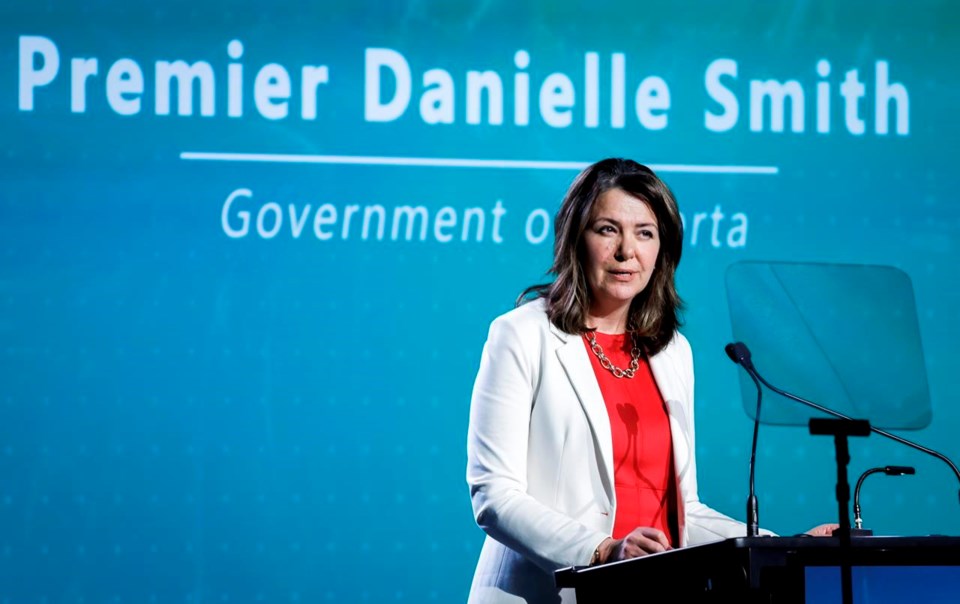EDMONTON — Some Prairie politicians are taking Ottawa to task over its green-energy plans amid bone-chilling low temperatures, claiming on social media that electricity grid alerts in Alberta show renewables can't be depended on when temperatures plunge.
"Right now, wind is generating almost no power. When renewables are unreliable, as they are now, natural gas plants must increase capacity to keep Albertans safe," Alberta Premier Danielle Smith posted on social media Friday, shortly after the province's grid operator issued an appeal for consumers to conserve electricity to protect the system.
A day later, following a second grid alert that warned of potential rotating blackouts, Saskatchewan Premier Scott Moe posted that surplus power it was sending Alberta's way was coming from natural gas and coal-fired power plants.
"The ones the Trudeau government is telling us to shut down (which we won't)," Moe said on X, the platform formerly known as Twitter.
The Alberta Electric Systems Operator said no blackouts were required following an emergency alert that was sent to people's phones shortly before 7 p.m., noting Albertans responded right away.
At the time, temperatures in much of the province were approaching -40 C.
Randy Boissonnault, the only federal cabinet minister from Alberta and one of only two Liberal MPs from the province, called the statements from the premiers "a petty, untrue and partisan attack." He blamed part of the issue on "decades of under investment in the electricity grid."
"Rather than tweeting nonsense about Canada’s plans to tackle climate change, perhaps the premiers can focus on the current emergency, and afterwards work with the federal government to deal with climate change," the Edmonton MP wrote in an email.
Alberta's grid operator has partially pinned the crisis on two natural gas generators that weren't operating, as well as a lack of renewable energy being produced due to low winds and a shortage of daylight at this time of year.
Smith has threatened to use the province's Sovereignty Act to challenge the federal government's clean electricity regulations over the Liberal's deadline to achieve a net-zero power grid by 2035, calling the target "unachievable."
Michelle Rempel Garner, a Conservative MP in Calgary, posted on her blog that if the electric system is already buckling under pressure, it won't likely be able to handle "further extreme demand created by Liberal regulations."
But a spokesman in Environment Minister Steven Guilbeault's office said the federal government has always said "reliability, along with affordability, is one of the driving forces behind how the regulations will be designed."
"The regulations would never put the province in a situation where they did not have a reliable baseload, and it is why we are making provisions so that fossil fuel burning plants can run without carbon capture technologies during peak usage or in situations of emergency," read an emailed statement.
"To say we want to 'shut down plants' is simply not the case."
University of Alberta energy economist Andrew Leach said Smith and Moe appear to be framing the debate as an either/or choice between natural gas and renewables. In reality, he argues, there needs to be a mix of energy sources, including better tie-ins with other jurisdictions.
Modellers know there will be days when demand will be high and generation from renewables is low, he said. Planning for backup needs to happen in advance, he noted, and it's the system operator's job to do that.
"Whether it's natural gas, nuclear, import capacity, battery storage, etc., geothermal. There's nobody that's arguing against that," Leach said.
Jason Wang, senior analyst on energy policy at clean-energy think tank the Pembina Institute, said Alberta needs to move ahead with changes to its market regulations so that energy storage from renewables can play a larger role.
Wang said that on Saturday, batteries were able to supply power for the first time during a grid event.
"Storage was able to basically buy us a few more hours of not needing a grid alert," Wang said.
Wang said natural gas generation also faces limits during extreme cold, though he said Alberta's generators are better prepared for that scenario than facilities in Texas that came under strain when a cold snap caused blackouts in 2021.
AESO Spokesman Leif Sollid said consumption dropped 100 megawatts within seconds of people receiving alerts on Saturday evening, and demand declined another 100 MW within a few more minutes.
"That was enough to make up the shortfall that we were facing and that prevented rotating outages," Sollid said in an interview Sunday.
The AESO declared another grid alert on Sunday afternoon, urging Albertans to reduce electricity consumption to essential use only until 8 p.m. to avoid the possibility of rotating outages.
This report by The Canadian Press was first published Jan. 14, 2023.
Rob Drinkwater, The Canadian Press




